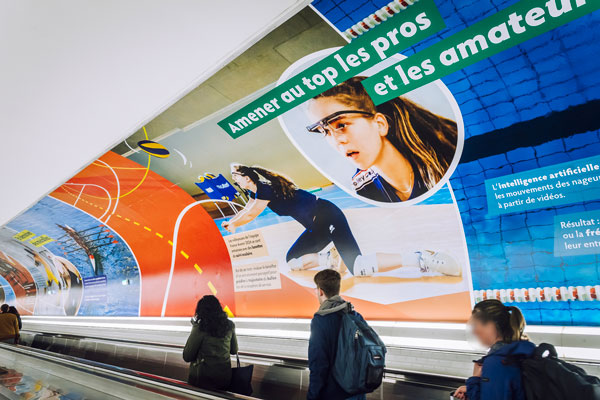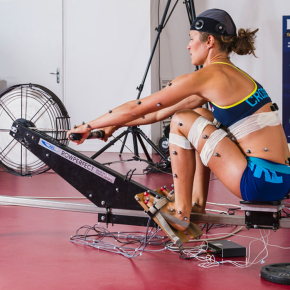Sport in the starting-blocks at the CNRS
The CNRS's stated mission is to put science at the service of society and currently, with Paris currently hosting the 2024 Olympic and Paralympic Games, the organisation is establishing itself as a major stakeholder in research into sports and physical activity as well as in innovation and knowledge sharing. Let's take a look back at CNRS activities in sports research.
Athletes under the microscope of researchers
Mathematics, physics, robotics, neuroscience, physiology, biomechanics, history, sociology, psychology, education sciences, regional planning... sports and physical activity research touches on a multitude of scientific disciplines. In 2019, the CNRS launched its Sports and Physical Activity Research Network to bring together sports and physical activity research stakeholders to work on multidisciplinary and interdisciplinary projects. To achieve this, the network (or GDR, for the French name Groupement de recherche) works on creating synergies between research laboratories, the sports industry and stakeholders ranging from sports federations and athletes to the general public.
The Sport GDR now counts 1250 members including 350 working in laboratories under CNRS supervisory authority and has produced over 16,000 international publications. At the end of last year, the 'Sport' GDR took stock of its work since its launch 5 years ago at a conference held at CNRS headquarters.
Sport - boosted by science?
A visit to Marseille's Institute of Movement Sciences (ISM) to find out how science is helping the world's greatest athletes... as well as amateur sportspeople.
Scientific research and sporting performance make a winning combination!
The CNRS has also been mandated by the State to provide scientific steering for the 'Sport and High Performance' Priority Research Project (PPR). The aim of this PPR is to "fund sports performance research projects the results of which are used by France's top Olympic and Paralympic athletes".
Cutting-edge sports research
Improving sports performances, pushing back the limits of disabled sportspeople, understanding how the brain functions in sports... innovations deriving from scientific research are boosting and supporting sportspeople on a daily basis.
One example is the 'Smartboard'developed by Laurent Vigouroux, a senior lecturer authorised to direct research at the Institute of Movement Sciences (ISM, CNRS/ Aix-Marseille University). This instrumented and connected training tool for climbing is based on his physiology and biomechanics research. The 'Smartboard' comprises a hang board connected to a smartphone and collects data in real time to help athletes monitor and improve their performance levels. This academic launched his 'Science for Climbing' start-up in 2019 and now climbers from the French team have been training with the SmartBoard in their run-ups to the Paris 2024 Olympics.
But in top-level sport muscles are not enough and the mind also plays a role. Training sportspeople's brains is Camille Jeunet Kelway's chosen research field. This CNRS cognitive science researcher with the Aquitaine Institute for Cognitive & Integrative Neuroscience (INCIA, CNRS/University of Bordeaux) has developed 'neurofeedback', a 100% science-based innovation that objectivises, quantifies, guides and motivates athletes in training.
Vance Bergeron, a physicist and research professor at the CNRS Physics Laboratory at ENS Lyon (CNRS/ENS Lyon), has developed a spectacular innovation that uses electrostimulation to help disabled people back onto bikes or rowing machines. He is the co-founder of the 'Circles' start-up and has opened a gym for sportspeople with motor disabilities who are helped to row or cycle on machines by stimulation from electrodes.
Now the innovation has developed to the point that Vance Bergeron's teams can integrate these electrodes directly into a 'made-to-measure' jogging suit that stimulates the wearer's muscles so the person starts pedalling or rowing.
Finally, the CNRS forges partnerships with industry which is notably the case of the 'DECATHLON Sportslab'. Here, researchers and manufacturers work hand in hand to develop sports equipment that is effectively adapted to the requirements and bodies of professional or amateur sportspeople.
Sport: sharing knowledge and taking part
The CNRS passionately advocates a knowledge-based society and also science that is open and firmly rooted in its era. As such the organisation promotes the circulation of knowledge and scientific culture as widely possible. The CNRS organises scientific mediation events, provides lists of experts for journalists and runs participatory science projects for the general public, among other initiatives. And knowledge is shared in many ways in the field of sports research.
All year long, the CNRS organises its 'Échappées Inattendues' events for the general public to ''explore the unexpected'' by meeting scientists to discuss a variety of themes. In 2023, a number of these events focused on sports research including the lecture on how sportspeople anticipate their upcoming actions and a second on training athletes' brains.
In a different vein, the CNRS designed the large-scale 'Sport and science, strength in numbers' fresco displayed in the corridors of the Montparnasse Bienvenüe metro station in Paris in 2023.

This exhibition highlights ongoing research aiming to help sportspeople improve their movements and performance, to fine tune innovations, to gauge the effects of physical activity on health or to fight discrimination. The exhibition is now touring French cities and can be reserved by contacting CNRS Images.
During the Olympic Games
At the upcoming Paris Olympic and Paralympic Games, the CNRS will be present at the 'Club France' under the Grande Halle de la Villette. The organisation will be presenting its research and a more specific participative research project on sport and physical activity. In this framework, French people will be invited to take part by declaring their sporting activities and events are planned all over France.
This is an attractive project for the general public which is in line with the CNRS's watchword of disseminating knowledge and also encourages people to take part in more regular physical activity.
